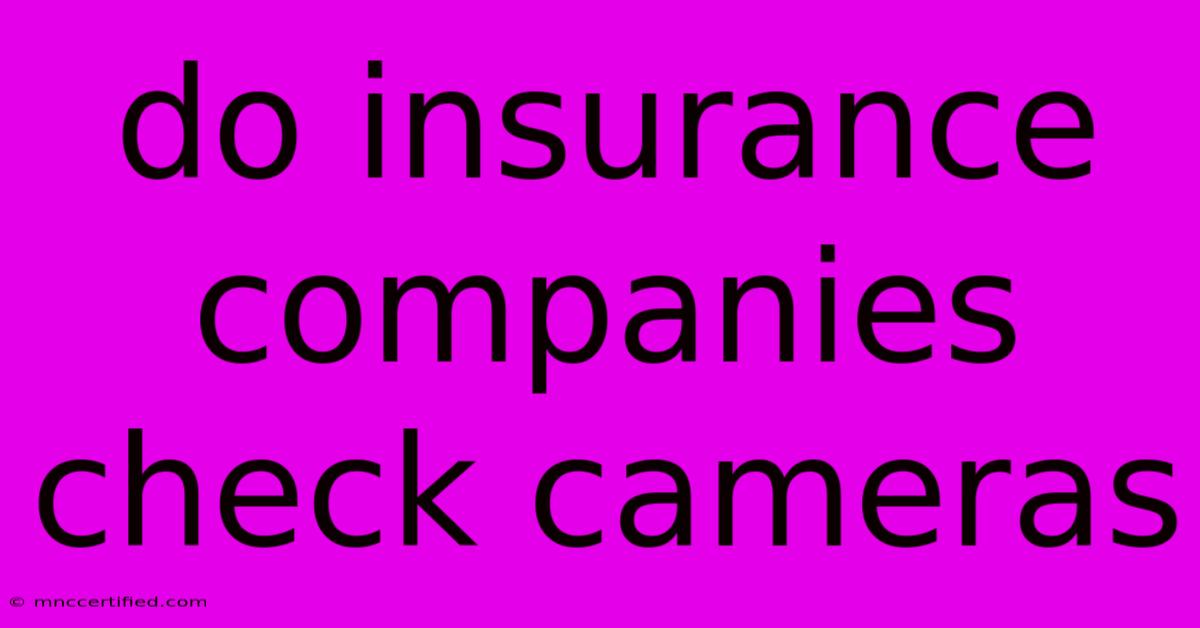Do Insurance Companies Check Cameras

Table of Contents
Do Insurance Companies Check Your Home Security Cameras?
In the age of smart homes and constant surveillance, it's natural to wonder about the privacy implications of your home security cameras. One question that often arises is: do insurance companies have access to your camera footage?
The short answer is it depends. There's no one-size-fits-all answer, as it largely depends on the specific insurance company, your policy, and the situation.
When Insurance Companies Might Access Your Camera Footage
Here are some instances where your insurance company might request access to your camera footage:
- Claim Investigation: If you file a claim, especially for a claim involving damage to your property, your insurance company may want to see evidence to verify your story and determine the cause of the damage. Camera footage could be invaluable in cases of theft, vandalism, or accidental damage.
- Fraud Prevention: If your insurance company suspects fraud, they might request camera footage to investigate. For example, if you claim a stolen item but camera footage shows it's still present in your home.
- Policy Compliance: Some insurance policies may require you to have specific security measures in place, such as a home security system with cameras. If you fail to comply, your insurance company could deny your claim.
Your Rights and Privacy
It's important to remember that your privacy is paramount. Insurance companies generally require your consent before accessing your camera footage.
- Review Your Policy: Carefully read your insurance policy to understand your rights and obligations regarding camera footage.
- Be Informed: Ask your insurance company directly about their policies regarding access to camera footage and how they handle your privacy.
- Control Your Data: Consider using security cameras that offer strong privacy controls, allowing you to selectively share footage or restrict access.
Best Practices for Home Security Cameras
- Strong Passwords: Use strong, unique passwords for your camera system and regularly change them.
- Secure Wi-Fi: Ensure your Wi-Fi network is secure and password-protected.
- Data Encryption: Choose cameras that encrypt your data both during transmission and storage.
- Privacy Settings: Use all available privacy settings to control who can access your footage and when.
Conclusion
While insurance companies may request access to your camera footage in certain situations, your privacy should always be protected. By understanding your rights, choosing the right security system, and following best practices, you can ensure your home security system is secure and your privacy is maintained.

Thank you for visiting our website wich cover about Do Insurance Companies Check Cameras. We hope the information provided has been useful to you. Feel free to contact us if you have any questions or need further assistance. See you next time and dont miss to bookmark.
Featured Posts
-
Real Sociedad 1 0 Barca Winning Streak Ends
Nov 11, 2024
-
Mountain One Insurance Pittsfield Ma
Nov 11, 2024
-
Vikings Defeat Jaguars 12 7 In Week 10
Nov 11, 2024
-
Saleme Insurance Services Altoona Pa
Nov 11, 2024
-
Tony Mowbray Back In The Game
Nov 11, 2024